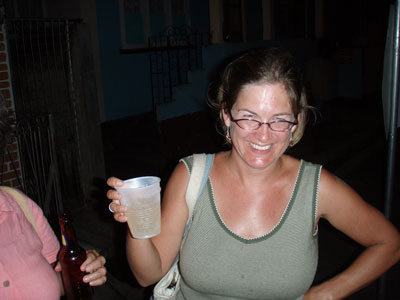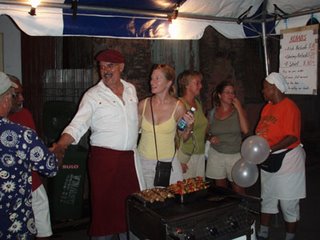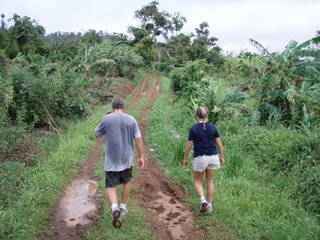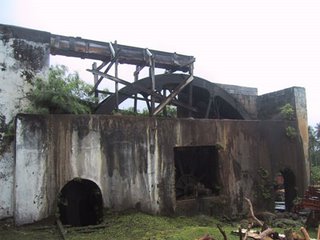Guest Blog - Lisa
Awe yes Trinidad. Before I finish up where Sharon left off I would like to add a little tidbit of my own. What made it such an adventure for me was sleeping on the boat on the bench behind the table. It only took a couple of nights of banging my knees into the table a few times to finally get the hang of getting up and going to the head without banging them. But sleeping on the boat had its benefits. I always got the first cup of coffee and got to hear “the net” which was the Cruisers news for the day.
Let me continue where Sharon left off...
We did get to see the leatherback turtles nest their eggs and see the Island, a great experience.
Our last day... the BIG 10th yr Anniversary Day for Sharon and Joe!!!
We got a late start to our day out on the boat. It wasn’t until around noon when we finally headed out for the day. The day was very warm and was slightly overcast. We headed back to Scotland Bay to anchor, so we could swim and fish for the day. The most important plan of the day was for Joe and Sharon to renew their vows at around 5:30pm out on the water.
At around 4:15ish we pulled up anchor and headed for the perfect spot for Sharon and Joe to renew their vows. We decided drifting in the middle of the "Mouth of the Dragon" would be the perfect spot. We were surrounded by water, green mountains and a blue gray sky, a perfect setting for the exchange of vows. Sharon and Joe headed to the bow to stand face to face to recite their vows, while the four of us looked on. Just as they started their vows, dolphins started to jump out of the water on the starboard side of the boat, we couldn’t have planned that any better. The tears, kisses and hugs came from the bow of the boat as the vows were exchanged, while Jill, Dean, Roger, and I got misty in the back watching the romance and love that was exchanged. When vows were done the champagne was popped, and the dolphins came back for a visit jumping and swimming next to the bow. How to end a romantic day and a perfect vacation. That night we shared a nice dinner and headed back to the boat to pack to go home.
I am sure I speak for all of us, Roger, Joe, and Sharon, that this was and unforgettable adventure, thanks to our good friends Jill and Dean.
Thanks Jill and Dean for everything and Safe Travels.
Let me continue where Sharon left off...
We did get to see the leatherback turtles nest their eggs and see the Island, a great experience.
Our last day... the BIG 10th yr Anniversary Day for Sharon and Joe!!!
We got a late start to our day out on the boat. It wasn’t until around noon when we finally headed out for the day. The day was very warm and was slightly overcast. We headed back to Scotland Bay to anchor, so we could swim and fish for the day. The most important plan of the day was for Joe and Sharon to renew their vows at around 5:30pm out on the water.
At around 4:15ish we pulled up anchor and headed for the perfect spot for Sharon and Joe to renew their vows. We decided drifting in the middle of the "Mouth of the Dragon" would be the perfect spot. We were surrounded by water, green mountains and a blue gray sky, a perfect setting for the exchange of vows. Sharon and Joe headed to the bow to stand face to face to recite their vows, while the four of us looked on. Just as they started their vows, dolphins started to jump out of the water on the starboard side of the boat, we couldn’t have planned that any better. The tears, kisses and hugs came from the bow of the boat as the vows were exchanged, while Jill, Dean, Roger, and I got misty in the back watching the romance and love that was exchanged. When vows were done the champagne was popped, and the dolphins came back for a visit jumping and swimming next to the bow. How to end a romantic day and a perfect vacation. That night we shared a nice dinner and headed back to the boat to pack to go home.
I am sure I speak for all of us, Roger, Joe, and Sharon, that this was and unforgettable adventure, thanks to our good friends Jill and Dean.
Thanks Jill and Dean for everything and Safe Travels.







